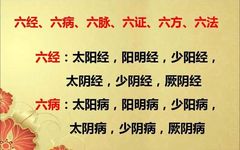Students, we will begin class.
1. Understanding the Six Meridians, Six Diseases, Six Qi, and Seven Emotions
1. Six Meridians: In a normal physiological state, the human body is divided into six levels, namely Taiyang (Greater Yang), Yangming (Bright Yang), Shaoyang (Lesser Yang), Taiyin (Greater Yin), Shaoyin (Lesser Yin), and Jueyin (Reverting Yin), referred to as the Six Meridians.
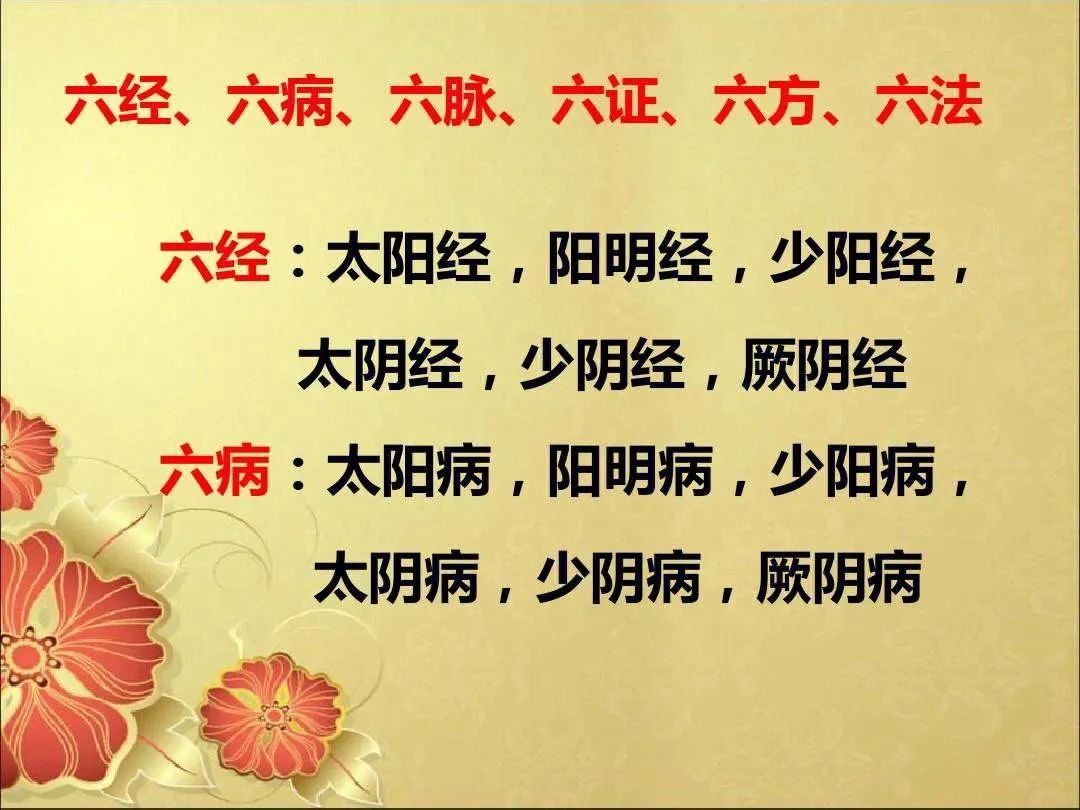
2. Six Diseases: When the body exhibits pathological states, the symptoms arising from these six levels are called the Six Diseases.
The Six Diseases refer to the pathological states of the Six Meridians, known as Taiyang Disease, Yangming Disease, Shaoyang Disease, Taiyin Disease, Shaoyin Disease, and Jueyin Disease.
3. Six Qi: Wind, Cold, Heat, Dampness, Dryness, and Fire exist in the environment at all times, which are the normal Six Qi.
4. Six Excesses: When external Wind, Cold, Heat, Dampness, Dryness, and Fire invade our body beyond its capacity to endure, it is called Six Excesses.
Excess refers to an excessive accumulation, too much of something entering our body.
Once it enters our body, regardless of which level it affects, whether it is Taiyang, Yangming, Shaoyang, or directly affecting the three Yin, it impacts the circulation of Qi and Blood in that meridian.
When the circulation of Qi and Blood in that meridian is affected, corresponding symptoms will arise.
5. Seven Emotions: Conversely, the internal generation of Five Evils, which are Joy, Anger, Worry, Thought, Sadness, Fear, and Shock, can also produce corresponding energy fluctuations. For example, Anger causes Qi to rise, Joy causes Qi to relax, and Fear causes Qi to descend, all of which can affect the operation of our body’s Qi mechanism.
6. Six Meridian Differentiation—Qi and Blood
In fact, regardless of whether it is internal or external evil Qi, as long as it affects any one of the six levels, it is considered a Six Meridian Disease.
It obstructs the Qi mechanism and affects the transformation of body fluids, which is the main symptom of the entire Six Meridian differentiation.
To put it simply, our differentiation focuses on Qi and Blood.
Who is affecting my operation? Who is obstructing my operation?
How can I break the deadlock?
How can I restore the operation of Qi and Blood?
That is all.
So this is very crucial.
2. Six Meridian Diseases
Continuing from the homework assigned yesterday. Yesterday, I assigned you to feel the Six Meridian Diseases through breathing.
In our last class, we asked everyone to feel the Six Meridians.
Last time, we had everyone pause at certain breathing points, at the 1/4 and 3/4 points.
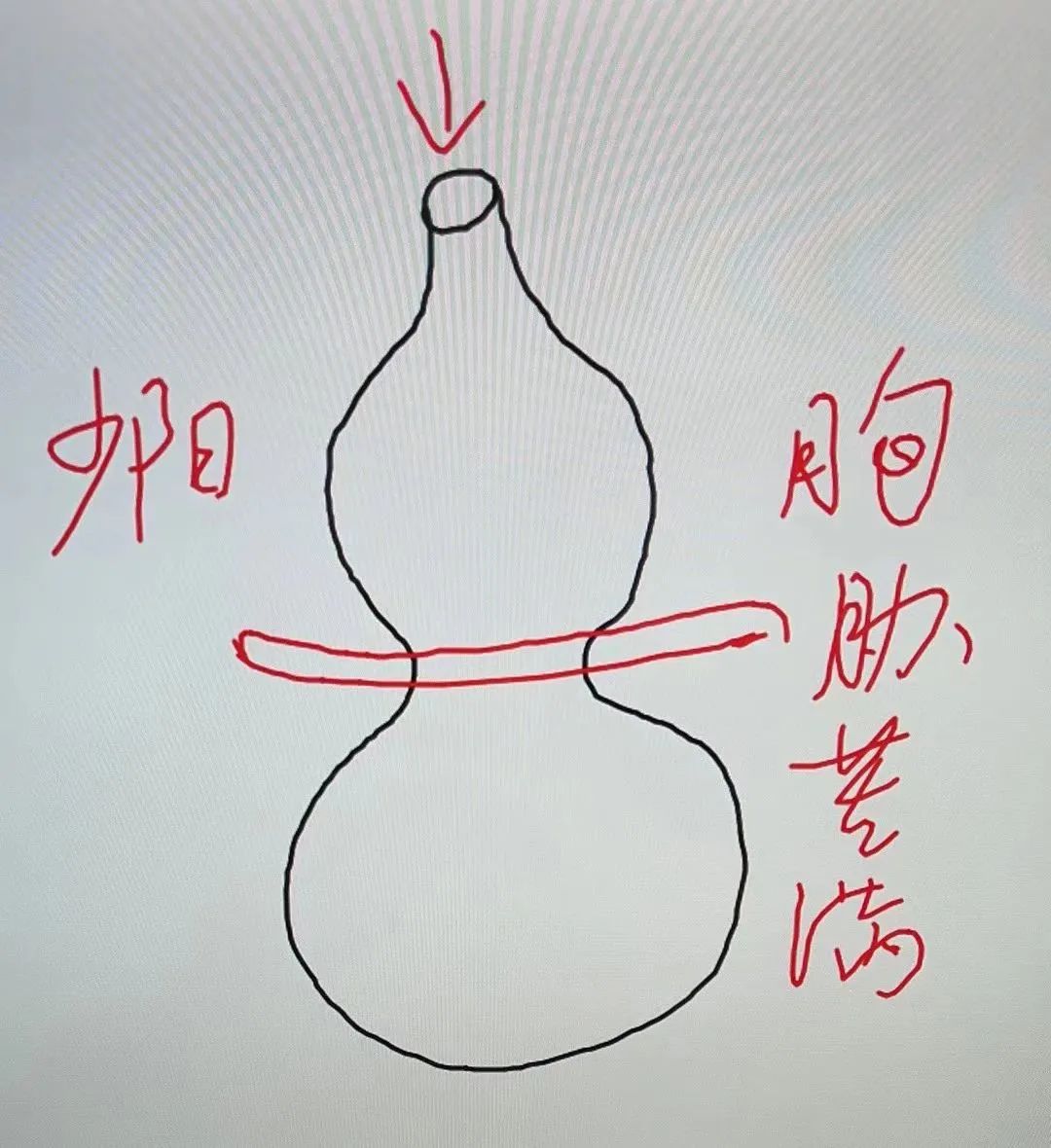
1. Shaoyang Syndrome—— Chest and hypochondriac fullness, bitter mouth and dry throat, dizziness, lack of appetite, irritability.
Think about it, is this pause a stagnation of Qi?
I inhaled to 1/4 and then stopped.
After stopping, the Qi still wants to go in, but it does not enter the lungs.
When we feel this pause, do not use your brain to think whether this is Shaoyang Disease or Taiyin Disease.
Do not think with your mind; feel with your body where it is blocked, and what sensations arise after it is blocked.
When we pause at 1/4, inhaling (gently)……, feel whether your chest and hypochondriac area are already in a state of fullness.
After feeling full, if a piece of osmanthus cake is placed in front of you, would you want to eat it?
You would not want to eat it; you have lost your appetite.
Do you have this feeling?
Then pause a bit longer; do you feel a bit irritable? Does it affect the heart’s operation, causing some irritability?
If you pause a bit longer, do you feel discomfort in your throat?
This is Shaoyang Disease.
I drew a gourd for everyone.
Explaining the Treatise on Cold Damage is quite challenging for me; how to make it understandable is quite taxing.

Before class, I wanted to draw a chest and abdominal cavity, draw a person, but I couldn’t do it, so I drew a gourd.
Now think, at 1/4, it is equivalent to the chest and hypochondriac area being pinched, the middle of the gourd is pinched.
After pinching, the Qi is all blocked in the chest and hypochondriac area, but the Qi does not fill the chest cavity.
It only occupies about 1/4, causing fullness and stagnation there.
Then it wants to rise; if it does not go down, it will rise, and if it does not go down, it will naturally rise.
It will move up to the throat.
You can also think of it this way: if this is a balloon, like a gourd-shaped balloon, if you pinch the middle and do not let the air go down, what will happen?
The upper part will bulge out and push outward.
The outline of Shaoyang Syndrome in the Treatise on Cold Damage is: bitter mouth and dry throat, dizziness, lack of appetite, feeling stuck, and irritability. This is Shaoyang Syndrome.
Shaoyang Syndrome is a state where Qi is stagnant inside, wanting to go down but cannot, wanting to rise but cannot, wanting to go out but cannot, a state of being half exterior and half interior, neither up nor down.
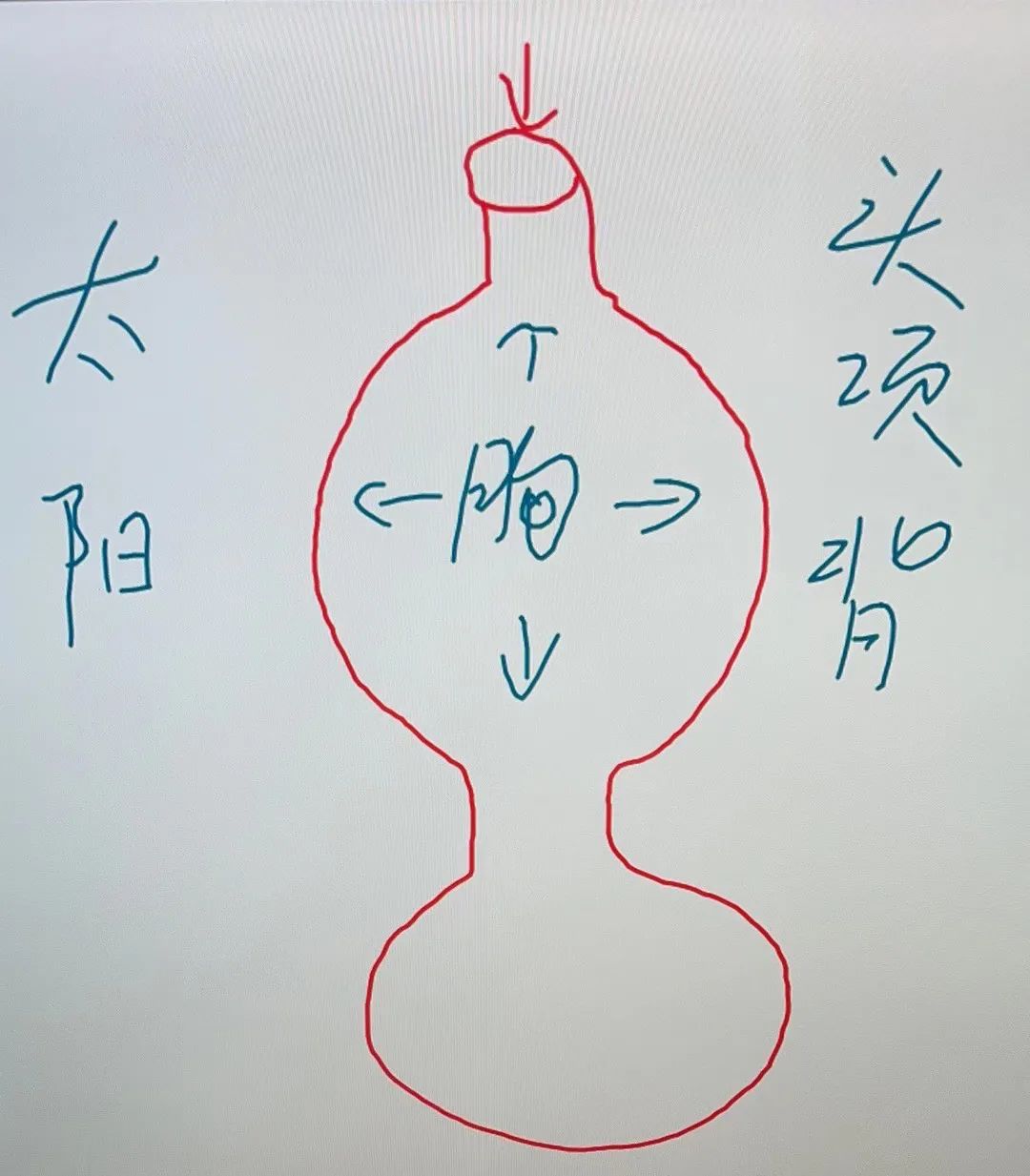
2. Taiyang Syndrome—— Chest fullness, headache, stiff neck, low back pain, shortness of breath or cough, fever, chills.
Now let’s look at the second gourd.
When we inhale to 3/4, hold it, the Qi still wants to go in, but we do not let it in, hold it, and stop.
After stopping, how is your chest cavity?
It has expanded; your chest cavity is full.
Then how do you feel?
When your chest cavity expands, the back, as the residence of the chest, will become tense.
Is your back tense?
Are the muscles in your back, neck, and lower back tense?
Is your head tense?
Do you feel a slight headache or tightness in the neck?
Do you feel like you want to exhale quickly?
When you exhale, how does it feel?
Shortness of breath or cough; this is Taiyang Disease.
If this state persists for half an hour, what do you think will happen?
Will you feel cold or hot?
That’s about it; you understand, this is Taiyang Disease.
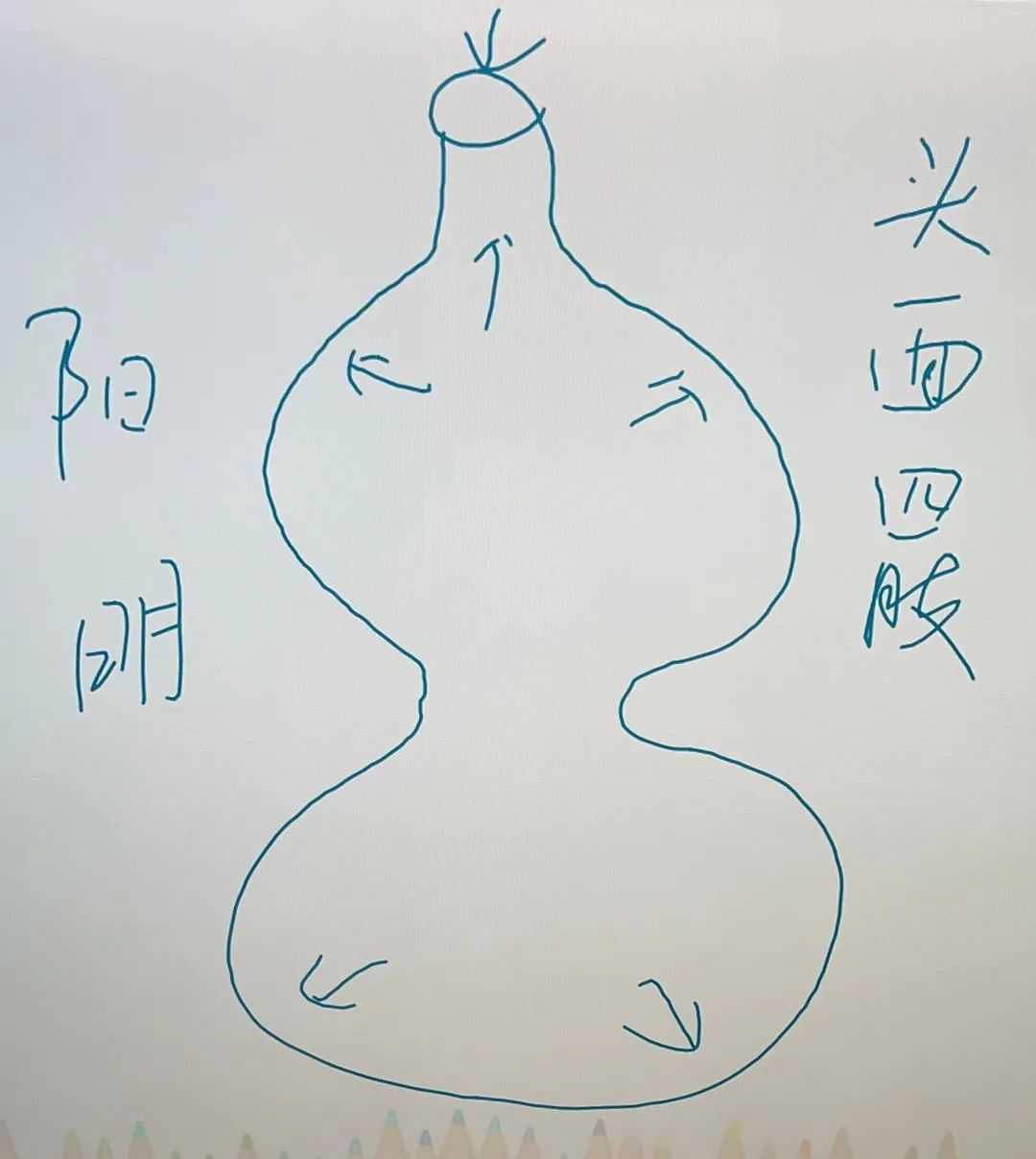
3. Yangming Syndrome—— Headache, facial redness, fullness in the limbs, neck and back pain, food stagnation, thirst leading to drinking, profuse sweating.
Now we inhale deeply, the belly is already full to the brim.
We hold it here and still want to inhale, just do not let it exhale.
While maintaining this state, what happens to our body? Where does our Qi and Blood flow?
Feel it.
Inhale, inhale deeply, fill your belly.
What do you notice?
Are your limbs swelling? Are your hands and feet swelling?
Is your head swelling?
Is your face swelling?
At this moment, when Qi and Blood are congested inside, what symptoms might arise?
We will feel differently at different levels.
For example, in the head, when you hold your breath, what happens? Your face turns red and your neck swells, right?
We say that person is holding their breath until their face turns red and their neck swells.
Have you seen someone playing the suona (a traditional Chinese instrument)?
It’s somewhat like that.
So it becomes extremely tense.
If it continues to be tense, will it not lead to a headache? Tightness in the neck, and if you hold it longer, you will start to sweat.
Now think about it, if your belly is always this full, when you tap it, it sounds like a drum, what is that? Why is it so full?
Is it because you need to pass gas?
If your belly is this full, will your stomach and intestines also feel bloated?
If you hold it longer, it will feel uncomfortable in the chest cavity, affecting the heart and breathing, making it difficult to bear.
If we hold it for three minutes, or even ten minutes, what do you think will happen?
You will start to sweat.
Let’s not hold it for ten minutes; let’s hold it for one minute, pausing this breath for ten seconds, and do this six to ten times. See if you start sweating; this is profuse sweating, and soon we will feel thirsty and want to drink.
This is thirst leading to drinking and profuse sweating; this is Yangming Heat Syndrome.
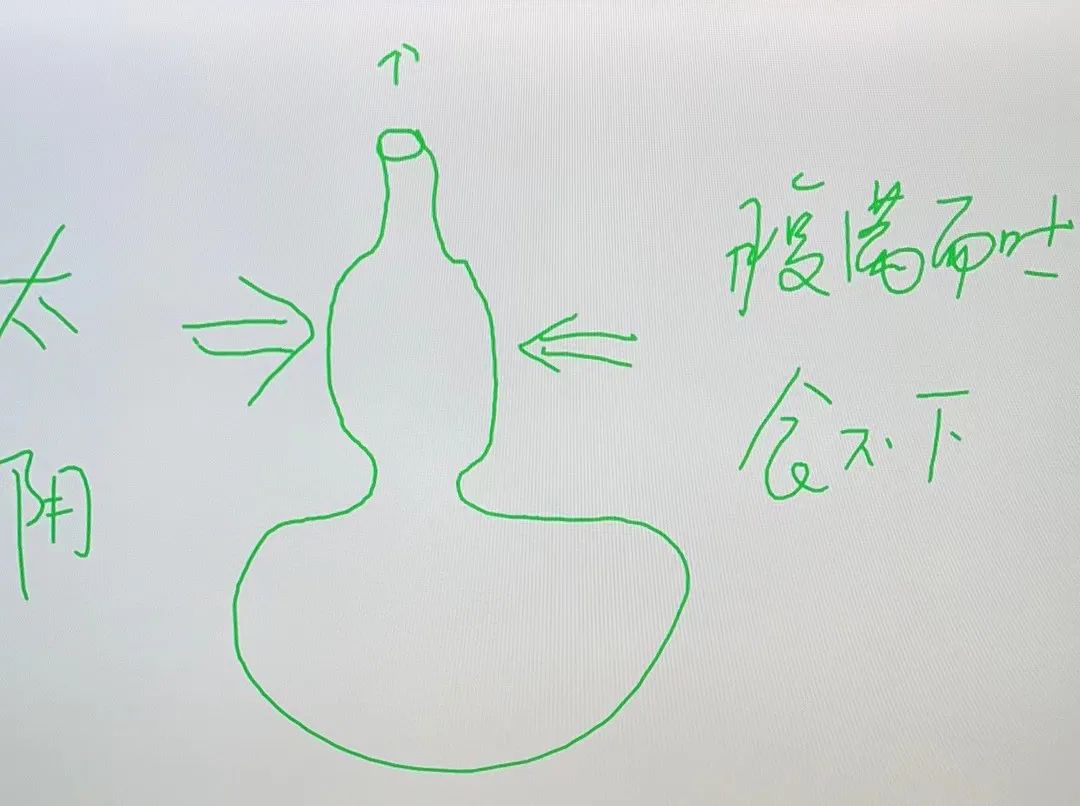
4. Taiyin Syndrome—— Abdominal fullness and vomiting, inability to eat.
Next, let’s talk about Taiyin Syndrome.
The Three Yin Syndromes start from breathing; we just started with Shaoyang, which is inhaling from the chest cavity.
Now we exhale, equivalent to expelling the Qi outward, and we stop when we still have 3/4 of the Qi left.
Look at this gourd; the air is being squeezed out from the top, while the air below has not risen; this is Taiyin Syndrome.
At this moment, what happens to our body?
Everyone look, breathe out…… hold it; what happens now?
The chest cavity is empty, and the abdominal cavity is full; this Qi and Blood, with the outward breath, will slowly flow to our hands and feet.
The air from the upper part is squeezed, and the air from the chest cavity moves to the arms.
The air in the abdominal cavity, due to the downward pressure, also moves to the legs.
Our belly is full and bloated; imagine turning yourself into a balloon; when you squeeze it, the back part will bulge out, hence abdominal fullness.
This fullness is not a problem; it also wants to expel, leading to the feeling of abdominal fullness and vomiting.
Try holding your breath for a while; do you feel a bit nauseous?
Think about it, the feeling of vomiting indicates that the Qi mechanism is reversing; can you still eat?
Or that piece of osmanthus cake placed in front of you, you also do not want to eat it; you cannot eat.
When you cannot eat, is there a blockage somewhere?
Is the Qi in your belly not allowed to rise? Where is it blocked?
It is blocked under the heart, at the area below the xiphoid process; this is where the blockage occurs.
Only when this area is blocked will you feel nauseous and unable to eat, a state of being neither up nor down, not passing through.
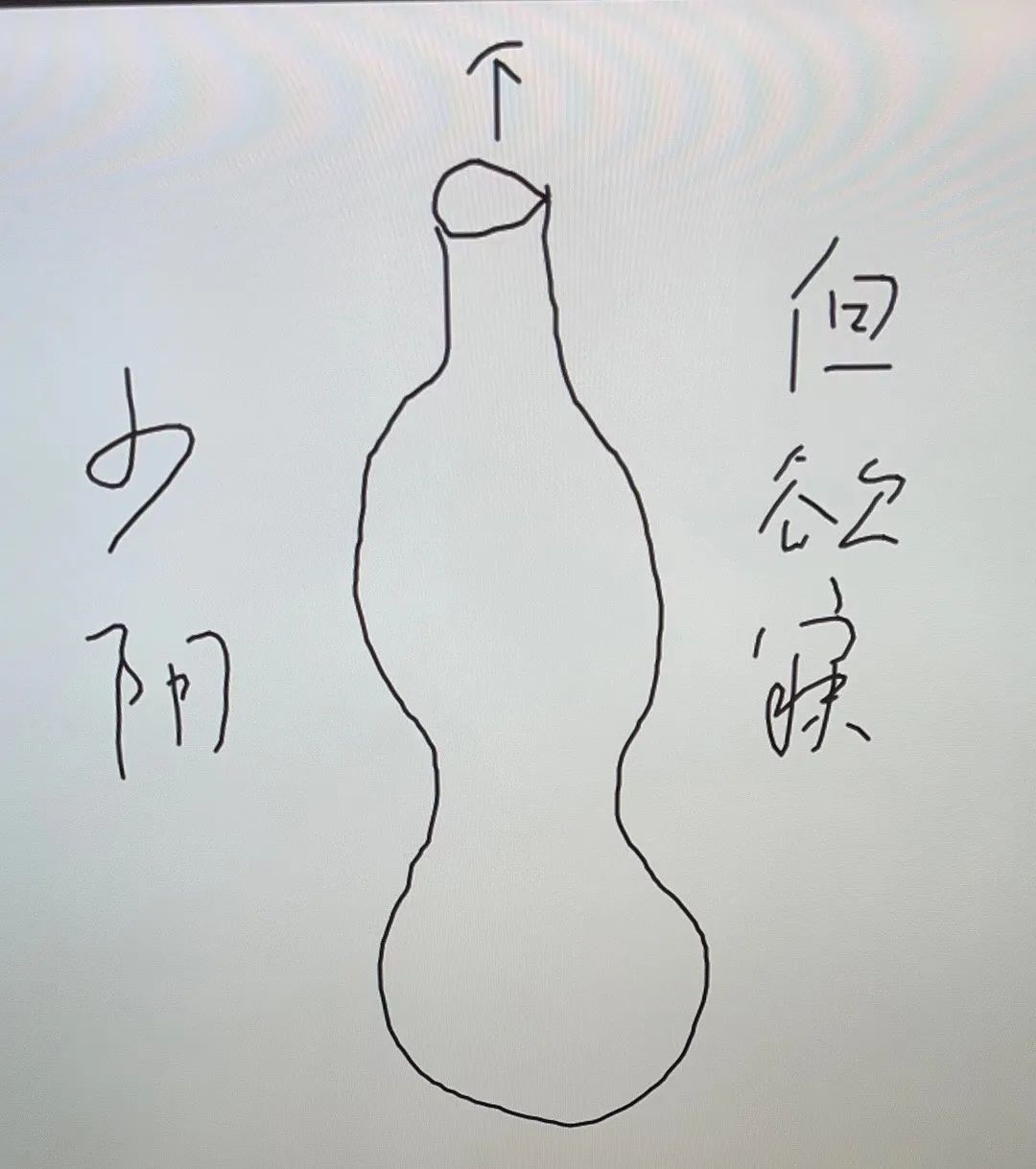
5. Shaoyin Syndrome—— Just want to sleep, fear of cold, weakness in arms and legs, mental fatigue, lack of appetite, weakness.
Continue to exhale, holding until only 1/4 is left, and then stop.
What happens to a person at this time?
Is there a feeling of being a bit weak, wanting to curl up, feeling lazy, wanting to lie down?
If this state persists for a long time, think about it; is it a state of weakness, a desire to sleep, a state of wanting to lie on the table to sleep?
This is Shaoyin Disease; just wanting to sleep.
When a person reaches this weak state, if it continues, what will happen?
They will feel cold, and their arms and legs will feel weak.
Over time, they will feel mentally fatigued, lack of appetite, and not want to do anything, feeling fearful. In this Shaoyin state, the body’s energy has all gone outward; in such a weak state, if they encounter cold evil, what will happen?
If they encounter heat evil, what will happen?
There will be differences in manifestation.
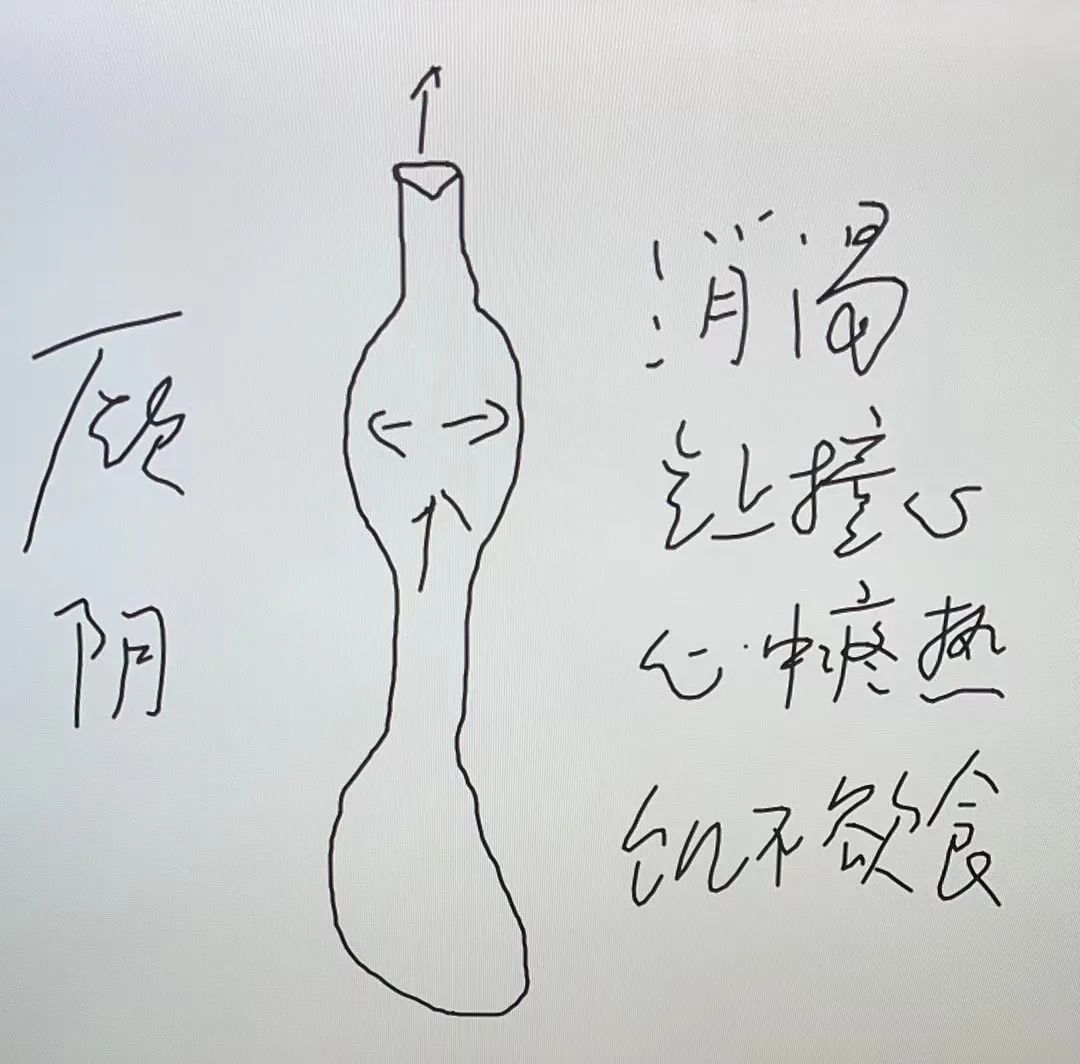
6. Jueyin Syndrome—— Thirst, cold hands and feet, Qi rising to the heart, heat in the heart, lack of appetite.
When we expel all the Qi from our body, it means expelling all our energy, and the body reaches an extremely empty state, not allowing you to inhale, maintaining this exhalation, not allowing the transition; what will happen?
All the energy in our body, including the arms, legs, and head, will gather in the center to save our body.
At this moment, what happens to our hands and feet?
They will be cold.
What happens to the heart?
What happens to the chest?
Because it is compressed to the limit, the heartbeat will be suppressed, and our body will feel restless.
Imagine being choked; there is no air; at this moment, you will feel anxious.
What does anxiety manifest as?
Qi rising to the heart.
The Qi in your belly is like squeezing a gourd, twisting it into a string bean; what will happen?
The Qi will push upward, causing Qi to rise to the heart.
What happens to the heart? The heart will be compressed, causing pain and heat.
When it is this congested, do you still want to eat?
Of course not; you will have no appetite.
Today we will stop here; everyone should go back and feel the state of these Six Meridian Diseases, the state of the body.
Once you experience this state, we will find a solution.
Why?
How you recover is how our treatment will help you recover.
Alright, class dismissed.

